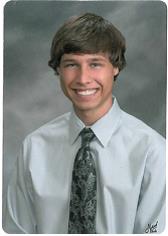The Red Shamrock Foundation is thrilled to announce the recipient of the inaugural Survivorship Scholarship! $1,000 will be awarded to Jacob Larkins, who is a Human Health and Physiology major at the University of Iowa, for his submission of the essay “Look Forward.” Jacob was diagnosed with Hodgkin’s Lymphoma in 2011 while a sophomore in high school. Thank you, Jacob, for telling your story and good luck with the remainder of your academic career!
By Jacob Larkins
“Jacob, would you like to take the year off from school and start up again next year?” asked my mom. Why would my mom ask such a question? It was because I had been diagnosed with Hodgkin’s Lymphoma just a few days before. Without hesitation, my answer to her was simply, “No.” I told her that I like going to school and seeing my friends and that it would also help me keep my mind off of things. The main reason I wanted to stay in school, was because I wanted to prove to others and myself that I was smart enough to continue to pass my classes and keep a good GPA while going through chemotherapy and radiation treatments. I didn’t want to give up on myself medically or academically.
In addition to my personal goals I achieved during and after my treatment, one of my new goals is to look forward by giving back to others. During the course of all my treatments I received help from Dance Marathon. I realized how important their contributions were to me, and the impact they can make on someone’s life. I have already begun the process of giving back, by holding a few Mini Dance Marathons to help raise money and awareness for pediatric patients. I was also a dancer and a speaker my freshman year in college and a speaker during my sophomore year. This year, I spoke to a small group and danced in the Big Event. I have enjoyed being involved with Dance Marathon throughout my college career.
In addition, I have started volunteering at the Ronald McDonald House. I was fortunate to be able to stay at the RMH for five and a half weeks during my radiation treatments in 2011. I also recently went on a service trip with the Newman Center to Port Ministries. During this service trip, I was able to help others less fortunate that myself. Being an active part of giving back helps me feel good about making an impact on others, as people did for me during my treatments.
As I have recently finished my junior year, it is apparent that I will meet the goals that I set for myself during my sophomore year of high school; medically and academically. I am fortunate to be able to work towards these goals right here at the University of Iowa and give back to others. My advice to someone who is diagnosed with cancer is to “Look Forward”.
Your financial support through this scholarship would help me continue to attend the University of Iowa and go into the medical field. I am currently in the Human Health and Physiology department. I would put it to good use to make a difference, in the same manner that others have helped me, while I was going through treatments for cancer. I have survived cancer, adapted, grown, and persevered by “Looking Forward”. Thank you for your consideration.


